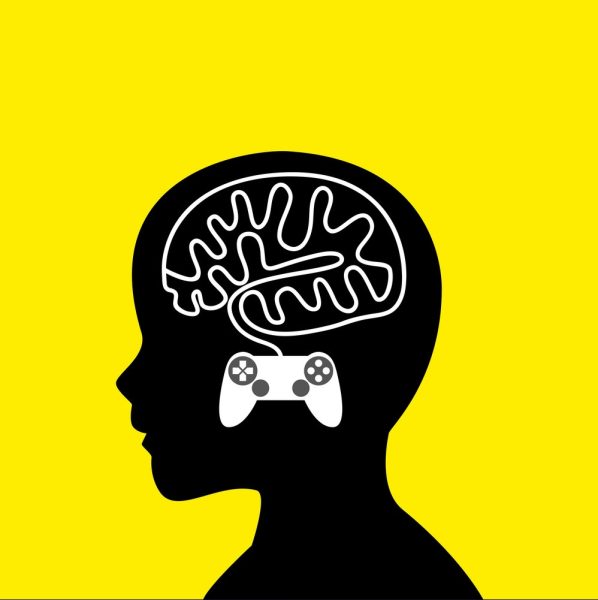
This year, students of Ms. Ledoux’s Dual Enrollment ENG 102 class were assigned the task of a large scale research assignment on a topic of their choice. Senior Coddan Nguyen chose a fun topic – video games! – but applied a research lens to analyze how video games can play a more productive role in our lives. Coddan’s writing here is a great example of how to use a familiar topic for an academic research paper effectively.
In our current civilization, video games reign supreme in the online community, as they are a form of entertainment that is loved by many individuals all over the world, especially a lot of students. The diversity of video games quickly branches out from shooter games that are action-filled to virtual realities that offer interaction and are typically appealing to students who spend most of their day acquiring knowledge and studying at school. Video games allow students to relax and catch their breath after a day of stressful school. The diversity of genres for different video games is one of the reasons why video games have been so admired by students. Along with the entertainment value, however, comes the question left unanswered by many: the impact of video games on academic performance and study habits. Do video games, a harmless recreation, become problematic when influencing students’ academic performance and study habits? Based on different sources and the relationship between video games and academic achievement, this paper will take into account different categories, such as the potential for over-gaming, which can be represented by taking students from the personal experiences of high school and university students in Bangladesh. While also acknowledging the negative effects of video games on academic performance, this paper will also provide other perspectives that may appear more positive concerning moderate video game consumption, for instance, potential cognitive and instructional benefits. Lastly, this research paper believes that video games are a shared form of entertainment among students, yet excessive gaming can negatively impact academic achievement and study habits; however, moderate gaming can provide advantages to students, including time management and the capability to balance leisure time and academic time. Most often, video games were purportedly known to be harmful to all children when they played.
The argument about the effects of video games, especially on the educational growth of young people is not a recent debate. The interest in video games developed from the arcade video games of the late 20th century to the more advanced digital games that are now accessible to people everywhere in their own homes, and as video games became more accessible, so did the rise of issues about the effects on children. Initial debates used to revolve around issues of addiction and aggression, with parents and teachers expressing worry over the amount of time children spent in virtual worlds, possibly playing many games.
As gaming continued to evolve and become a part of student’s lives, the topic of the debate grew to encompass the potential impacts of cognitive development, social life, and academic engagement. As technology is continuously becoming increasingly available and evolving societal concerns have led to increasing research on this debate of whether video games do have an impact on study habits and academic performance or not. This essay shall also discuss and look closer at the relationship between playing video games and academic achievement in this technological era. Contributing another dimension to the existing worry over the potential harm that can be caused by gaming, especially in excess, an experimental study was formulated, one which offers evidence of its negative contribution to academic performance. For instance, a cross-sectional survey conducted among Bangladeshi university students (Mahmud et al., 2023) shows a significant correlation between students who spend more than 300 hours a week playing online games and lower cumulative grade point averages (GPA). In addition, the study indicates that these students devoted less study time and less time to spending more time outdoors being active because their time was heavily invested in gaming, not academics, and a healthy lifestyle.
Through this study specifically, Bangladesh university students who are avid gamers can achieve lower GPAs. Time spent on gaming is wasted instead of being spent on study activities, leading to a decline in academic performance, both in grades and in studying, as well as in the student’s life. Although over-gaming affects Bangladesh students’ academic performance, this also ends up being shown in the students’ own lives. In a personal interview done for this paper, Kaden and Will both presented evidence for the potential case that excessive gaming does have adverse effects on our study habits and GPAs. Will (Giannopoulos, personal interview, 2025) a South High Community School high school student, describes a trend of spending several hours playing games with friends immediately after school, which had the effect of delaying or even shortening the amount of time he spent on things like exercise, studying or doing anything remotely healthy. He admits that “a lot of my study time does become video game time,” showing a direct exchange between study time and gaming time.
Similarly, Kaden (Truong, personal interview, 2025) observed a significant difference in his study habits during his junior and senior years. During his freshman and sophomore years he was playing video games constantly, which made his grades drop significantly, and he also had his study habits, unlike his later high school years. He remembers in the interview “I remember doing my homework in maybe 10 to 15 minutes a night, and the rest of my day was turned into gaming time”. As a comparison, in his last two years of high school, when he transferred to South High Community School, he significantly reduced his gaming activities. Spent nearly two hours every evening doing homework and studying academics, which directly relates to his drastic grade improvements. The difference between his first few years of high school and his later years illustrates how his commitment to video games can affect the time and energy invested in his academic life. Contrary to the negative view of the impact of video games, some perspectives and sources suggest moderate video game playing can have some cognitive and even educational benefits for students. The Houghton Mifflin Harcourt (HMH) blog discusses some of the ways that video games positively impact learning such as the fact that they help with the development of critical thinking and improving problem-solving skills. Because several skills are being exercised while playing games, video games can certainly have a beneficial aspect regarding learning, and this article argues that well-designed games allow players, in this case, students, to analyze complex situations, strategize, and adapt to continuously changing situations. These abilities can then be applied to academic learning by being given challenging sets of problems, they have to use critical thinking and problem-solving skills to figure out how to tackle each problem and solve it.
In addition, the interactive aspect of video games promotes motivation for students to want to continue through different obstacles, and these qualities are efficient and effective in school, or the general school setting. While such benefits do not necessarily talk about study time, learning various skills from a moderate amount of gaming can indirectly benefit academic performance by allowing students to develop different cognitive abilities. Also supporting this hypothesis that video gaming can potentially benefit students, Dr. Kris Alexander, in his TED Talk (2023), argues that design principles implemented to create video games can be translated into better learning. He assumes that a well-designed game can get the players involved to remain motivated to achieve goals and get instant feedback and a sense of advancement. Alexander suggests they are straightforwardly relevant to classroom settings or a learning setting, by students retaining skills such as forming a goal, getting feedback, and working with feedback that the players/students receive. For example, trial-and-error learning in most games allows students to persist and learn other problem-solving skills without having to deal with the fear of a high-stakes failure, unlike in schools where students fight high-stakes testing with anxiety. Skills and learning them from games are beneficial because they transfer easily to help students deal with traditional academic testing.
In addition, the storytelling and graphic content of most games can interest and capture students’ attention in more ways than traditional lectures, homework, and reading assignments assigned by teachers.
Alexander repeatedly challenges students throughout the TED talk to shift their attitude toward gaming. All gaming is not bad and with games now becoming platforms where students can learn critical thinking and focusing abilities, games can become beneficial to learn and implement different game mechanics, which can be transferred into learning experiences. Learning these abilities has the possibility of helping academic performance for the majority of students because students gain the ability to learn new learning abilities that they obtain from video games, educational or not. Time management is one of the most critical factors in examining the relationship between video games and academic performance. Time management becomes the key skill that needs to be mastered, or at least learned for students to have their leisure time, without compromising their academic performance and study habits. A paper by Orioque and Selpa (2021), on Filipino undergraduate students indicates that online gaming does not necessarily have adverse effects on study habits or academic performance.
In their paper, one of the key findings identifies that students who had good time management skills had been able to juggle both leisure time, in this case, video games, and studies without any dip in performance. The major variable in this research is the fact that students can play video games, but if they lack good time management skills, then it seems their grades will be affected. These students spend a great deal of time creating strategies such as setting specific times for gaming and studying, completing schoolwork first, and keeping to a timetable, which allows them to focus on schoolwork while also creating a normal schedule that allows for much more leisure time. A recurring theme of time management in the paper underscores the central position that it occupies in the relationship between video game usage and academic performance. While excessive gaming certainly poses threats to study routines and educational achievement, both empirical data and personal accounts have shown that students’ time management ability seems to be the determining factor in their school performance and the quality of effort they invest in schoolwork.
Research by Orioque and Selpa (2021) specifically highlights that students who can manage their time for certain activities can fit video games quite comfortably into their lives without feeling the impact on their academic performance and decreased study hours. This is to say that the conversation between video games and academics must be more than the potential drawbacks of gaming, but also regarding seeing the possible skills that students have to manage their responsibilities. As students go through the day, they make certain commitments such as their school life, sports life, family life, and leisure time for themselves, but with so much focus on leisure time for themselves, students can’t keep up with all their commitments. In line with the final goal of striking a balance between academic and recreational life, time-management abilities become more significant for students due to the desire to maintain academic wellness and achieve academic success. Encouraging time management skills can be more productive for academic success and with a world full of technology, games can be encouraged instead of always needing to criticize students for gaming in their free time.
Other than the fundamental role played by time management, another key factor to identify would be the influence of the different and specific games played by the students. As Wright (2017) would suggest, the type of games played, the purpose of gaming (e.g., recreational, socialization, competition), and a student’s overall academic practice and attitude could all be factors in the ultimate influence of video games. For some students, moderate gaming might serve as a stress reliever or a way to connect with peers and create friends, which can indirectly support potential academic success. Conversely, even just a moderate amount of gaming can serve as a procrastination tool if not managed properly. This complexity is once again brought out by the lack of any definite universal correlation between playing video games and scholarship, as hinted at by Slobodan Adžić et al. (2021). The impact on academic performance is not contained to just the game though, it has a wide variety of variables such as the individual habits, characteristics of the specific game, and if the individual can incorporate gaming into their lifestyle without creating academic failures. Therefore, generalizations about video games should not be assumed quickly due to many diverse experiences, and with every student experiencing different things, assuming that academic performance from gaming time should not be quickly deduced.
While exploring the potential downfalls of excessive gaming alongside the potential benefits of gaming in moderation, the central theme that emerges is the importance of balance, and self-regulation, specifically time management. While there are studies such as the one in Bangladesh and personal experiences such as Will and Kaden that show the risks of playing video games excessively at the expense of their academic responsibilities, different sources provided different perspectives such as Orioque and Selpa’s understanding of the cognitive benefits and the importance of time management. Ultimately, the impact of video games on a student’s academic journey is not solely based on engagement or abstinence from video games, but rather on the student’s ability to manage their leisure time into a well-balanced lifestyle. Fostering these skills allows students to enjoy the benefits of the developing love for video games that the world is experiencing without compromising their academic goals. As the world increasingly embraces the digital future and love for video games, rather than restricting students from playing video games, parents and educators could empower students by emphasizing strategies for time management, providing them with the crucial skills to travel through this constantly evolving digital world.
Work Cited
Alexander, Kris. How Video Games Can Level Up the Way You Learn. TED, July 2023,
http://www.ted.com/talks/kris_alexander_how_video_games_can_level_up_the_way_you
_learn. Accessed 1 May 2025.
Giannopoulos, William. Personal interview. 27 March 2025.
Houghton Mifflin Harcourt. “Benefits of Video Games in Education.” Houghton Mifflin
Harcourt, 12 Apr. 2024, http://www.hmhco.com/blog/teaching-learning/benefits-of-video-games-in-education.
Mahmud, Shohel, et al. “Online Gaming and Its Effect on Academic Performance of Bangladeshi University Students: A Cross-Sectional Study.” Health Science Reports, U.S. National Library of Medicine, 15 Dec. 2023, http://pmc.ncbi.nlm.nih.gov/articles/PMC10723781/#:~:text=The%20findings%20shows%20that%20a,least%2030%20h%20per%20week.
Orioque, Janet & Selpa, Haide. “Digital Gaming: Implication to Undergraduate Students’ Study Habits, Academic Achievement and Time Management.” Journal of Innovative Technology Convergence, vol. 3, no. 2, 2021, pp. 11-20, doi: 10.69478/JITC2021v3n2a02.
Slobodan Adžić, et al. “The Impact of Video Games on Students’ Educational Outcomes.” Entertainment Computing, Elsevier, 2 Feb. 2021, http://www.sciencedirect.com/science/article/abs/pii/S1875952121000094.
Truong, Kaden. Personal interview. 3 April 2025.
Wright, Jancee. “The effects of video game play on academic performance.” Modern Psychological Studies, vol. 17, no. 1, 2011, Article 6.





